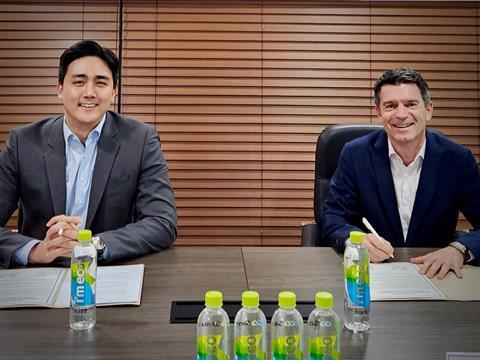
Sansu and TotalEnergies Corbion have agreed to produce a 100% Luminy PLA bioplastic bottle with an embossed label in hopes of simplifying the recycling process and driving the adoption of recycled PLA as a feedstock.
TotalEnergies Corbion has worked with Sansu to recycle post-consumer PLA since 2019, but the removal of labels and caps in order to crush, clean, and depolymerize the packaging waste has proven to be an inefficient process. A 100% PLA bottle is hoped to negate the removal of extra components and streamline the recycling process.
Apparently, new developments in recycling technology have led to the production of rPLA with comparable qualities to virgin Luminy PLA, such as safe food contact.
Providing PLA with 20% and 30% allocated recycled content, TotalEnergies Corbion supplies a range of global customers. Sansu plans to take the ‘bottle-to-bottle’ approach in a joint effort to encourage the implementation of Luminy PLA bioplastics, thus lowering reliance on carbon-intensive virgin plastics.
The agreement has been signed by Thomas Philipon, CEO of TotalEnergies Corbion, and Ji-Hoon Kim, CEO of Sansu. It expects to complement the United Nations Sustainable Development Goal 17 by bringing companies together in pursuit of sustainable progress, namely environmental responsibility and circularity.
“This partnership is another example of how TotalEnergies engages with partners in the value chain to advance the adoption of Luminy PLA bioplastics and contribute to lowering carbon emissions from plastic usage,” says Philipon.
“Furthermore, this collaboration is a clear example of design for recycling which can also be applied to PLA. This initiative is in line with the Packaging and Packaging Waste Regulation being finalized in the EU and promoting design for recycling criteria.”
Previously, TotalEnergies Corbion announced that it would buy reprocessed PLA waste to recycle into its Luminy rPLA brand – a move hoped to contribute to the bioplastic’s collection, sorting, and cleaning, as well as creating a PLA recycling stream.
Since then, it has partnered with POSCO International and ESOL in an effort to improve South Korea’s recycling infrastructure and technology for PLA; and it has signed a Memorandum of Understanding (MOU) with Bluepha Co. in the hopes of bolstering the adoption of PLA- and PHA-based solutions on the Chinese market.
Meanwhile, Korea Crystal Beverage’s Montbest ultra-pure water brand worked with Gentlebrand to design an embossed, label-free water bottle back in 2022. The move was intended to align with South Korea’s plastic reduction efforts.
If you liked this story, you might also enjoy:
The Brief: How viable is biorecycling for plastics?
Report: How the top brands are progressing on packaging sustainability
The Brief: Using ocean-bound plastic in packaging – how, why and should we?














No comments yet